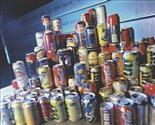
Why Recycle Aluminium Cans?:
- Recycling aluminium drinks cans saves up to 95% of energy used in production of aluminium from raw materials and reduces greenhouse gas emissions by up to 95%.
- Saves non-renewable natural resources by reusing non virgin material
- Cuts waste disposal costs by meaning less goes to landfill
- Requires less energy so means less carbon is emitted
Why Recycle Steel Cans?:
- Recycling helps to minimise the use of non renewable resources such as iron ore, limestone and coal
- Cuts waste disposal costs by meaning less goes to landfill
- Using scrap steel saves up to 75% of the energy needed to make steel from virgin materials
- It is cheaper for a company to make the cans from recycled steel rather than virgin steel
Before You Recycle:
Wash food and drink containers and put the lids inside before you take them to the recycling centre or put them out for collection.
Squash drinks cans so that they take up less space.
Some Local Authorities have started to collect aerosols for recycling. Do not try to squash, pierce or otherwise damage these, as this is dangerous.
Make sure you only recycle empty aerosols. Try and separate out the parts that make up a can such as the plastic top and steel body.
Some steel products such as fire extinguishers and shock absorbers, can’t be recycled through the normal waste stream. These should be returned to the supplier or sent to a specialist recycling company.
Aluminium Recycling Process:
Stage 1:
Aluminium cans can be collected through can banks, kerbside collections or cash for cans centres.
Stage 2:
Once the cans have been collected they are then sorted, baled and taken to a dedicated recycling plant.
Stage 3:
The bales of cans are shredded into small pieces, and the paint and other contaminates are removed by blowing very hot air through the shredded metals.
Stage 4:
The shreds of metal are then melted down and poured in to ingot moulds, while being cooled by a curtain of water.
Gradually a solid ingot is formed usually 15 metres long and weighing around 27 tons. They usually contain around 1.5million recycled aluminium cans.
Stage 5:
The ingots are transported to a factory where they are rolled in to very thin coils of aluminium. One ingot can be rolled out in to 26km of aluminium coil.
Stage 6:
The coils are then transported to can makers and are manufactured in to new cans.
Stage 7:
The cans are then filled and sold in supermarkets ready to be drunk and recycled again.
Interesting Facts:
- Steel and aluminium cans can be recycled multiple times with no loss in quality
- 60% of cans in the UK are recycled
- £176,000,000 of mixed cans have been collected since 2002
- Aluminium cans can be recycled and be ready to use again in 6 weeks
- If all cans were recycled there would be 14million fewer dustbins of rubbish each year
- Making one can with raw materials uses enough energy to make 20 using recycled material